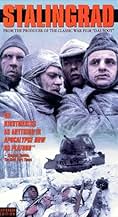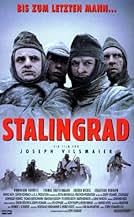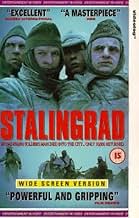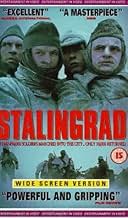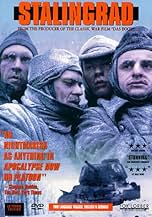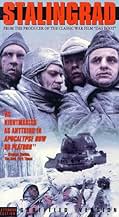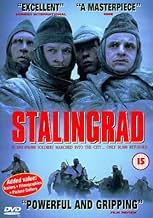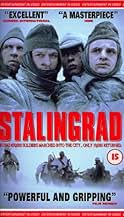Narra la historia de un grupo de soldados alemanes, desde su periodo de descanso y recuperación en la Italia del verano de 1942 hasta las estepas heladas de la Rusia soviética y terminando e... Leer todoNarra la historia de un grupo de soldados alemanes, desde su periodo de descanso y recuperación en la Italia del verano de 1942 hasta las estepas heladas de la Rusia soviética y terminando en la batalla de Stalingrado.Narra la historia de un grupo de soldados alemanes, desde su periodo de descanso y recuperación en la Italia del verano de 1942 hasta las estepas heladas de la Rusia soviética y terminando en la batalla de Stalingrado.
- Dirección
- Guionistas
- Elenco
- Premios
- 3 premios ganados y 1 nominación en total
- Pfarrer Renner
- (as Eckhardt A. Wachholz)
Opiniones destacadas
The combat scenes themselves are even more horrific. In one scene a German soldier hits a Russian over the head with a shovel as the Russian is trying to kill Ltn. von Witzland. In another scene a German soldier is cut in half by a Russian tank shell. There are many other gruesome scenes in the film, but they are necessary. The world has to see what happened in the Battle of Stalingrad. To see its brutality. To have its heart broken at the horrendous waste of the soldiers' lives. Over 2 million people lost there lives. Only 6000 of Field Marshal Paulus' 250,000-man 6th Army survived the battle. As with the battle, the film itself does not have a happy ending. And that's the way it should be. And as you watch this film, remember one thing, not every German soldier who fought in the war was a criminal. They were mostly decent people caught up in events well beyond their control.
The film revolves around four soldiers fighting in Stalingrad. They were transferred there to try and take the city. The film follows these men from August of 1942 to early 1943. During this time, they learn about the horrors of war and try to find a way out of the battle.
Through the entire film, one feels the desperation of the entire battle. Unlike "Enemy at the Gates" the film makers didn't try to put some sappy love story or dress up factual occurrences of the battle. This film may be fiction, but it conveys what happened in the bloodiest battle in World War II.
Moreover as far as the political side is concerned the film never surpasses the level of the 08/15 films by Paul May: it is simple in its division between the politically "good" and "bad" soldier, finding the latter in the higher ranks only, while the lower and lowest in rank are basically decent people; the soldier is just another victim of the regime. Compare this, if you have ever the opportunity, to what 6 German ex-soldiers tell about their experiences at the Russian front in the documentary "Mein Krieg" by Harriet Eder and Thomas Kufus (q.v.). I certainly do not want to suggest that Vilsmaier excuses the war (or worse), but he does not succeed in incorporating the socio-political situation, if he had ever the intention to do so..
There are surely impressive scenes (short truce in the plant; attack of Russian tanks, shooting of Russian civilians e.g.) and the battle scenes ar extremely well choreographed; the cinematography is sometimes stunning. But on the minus side: the cast is never more than average and the music is heavy handed.
In short: despite elementary shortcomings, certainly worth a view.
2. Screenplay has a different structure. There's no shocking opening scene like in 'Saving Private Ryan'. This movie starts slowly in a very nice place and ends slowly in a very bad place, without hope or feeling that the characters have achieved something by their heroic actions.
3. It is first a movie about lost causes in the world of war, and only secondly a war movie which takes place in Stalingrad.
4. War scenes portray the horror, insecurity and confusion of a battle, instead of how cool, heroic and exciting fighting looks like. In this sense, this movie is closer to reality than most of the war movies you will ever see. 'Thin Red Line' also had similar "I would probably crap in my pants in that situation"-feeling.
Stalingrad, whether you think it as a movie or a war movie has so many good things in it... like honesty. Even the ordinary German soldiers were dreaming about farms in Russia when they were advancing. What a disappointment they must have had in Stalingrad! If you like to watch war movies, meaning also other war movies than When We Were Soldiers or Saving Private Ryan, you should see this one. (9/10)
¿Sabías que…?
- TriviaChristoph Fromm wrote the original screenplay. The producers disagreed with his more realistic direction. They had it rewritten, and Fromm took his name off the film.
- ErroresTowards the end of film a Ju52 drops a single supply parachute. When dropped out of the plane and falling towards ground, it is green, when they recover it on the ground it is white. (In reality the Luftwaffe was first using white parachutes until they realized it is too difficult to spot white parachutes on the snowy ground.)
- Citas
Lt. Hans von Witzland: The best thing about the cold is...
[Witzland dies]
Fritz Reiser: [holding the body, he laughs] You don't have to worry about sunburn. Ever been to the desert? You'd hate it. It's so hot, you're always sweating. You think you're melting, like butter. The desert is shit. Except for the stars. They're so close, you know?
[dies]
- ConexionesFeatured in The 100 Greatest War Films (2005)
Selecciones populares
Detalles
Taquilla
- Presupuesto
- DEM 20,000,000 (estimado)
- Total en EE. UU. y Canadá
- USD 152,972
- Fin de semana de estreno en EE. UU. y Canadá
- USD 10,882
- 29 may 1995
- Total a nivel mundial
- USD 152,972
- Tiempo de ejecución2 horas 14 minutos
- Mezcla de sonido
- Relación de aspecto
- 1.85 : 1
Contribuir a esta página


